Who says you can’t attract clients while working part-time on your online business? If you create the right content, good content, you’ll see a significant increase in client acquisition.
Content marketing works. That’s why a growing number of B2B marketers have documented plans to invest more in content marketing over the next year.
There is a rise in professionals working part-time. Most people now prefer to hold two or more different jobs, in order to make more money. Of course, they may not be passionate about those part-time jobs, especially when the jobs are necessary to take care of pressing needs.
If that sounds like what you’re going through, don’t lose hope. All is not lost.
You can still take your online business to the next level of success by attracting and retaining visitors who then become your clients. This article will show you how to build a successful part-time business from the ground up using a content marketing strategy to find a new potential customer.
Without further ado, here are 12 easy steps to attract clients as a part-time content marketer:
Step 1: Identify Your Expertise
Without a doubt, your skills & expertise and your applications of those skills will determine how much money you can make.
Know what you’re good at and then hone your skills. Of course, skills such as writing, graphic design, SEO, and public speaking can all be learned. But, if you want to base a successful part-time business on those skills, you’ve got to be passionate about them. Your skillset can take you places, even if you don’t spend eight hours a day using those skills.
What are you good at? If you work full-time at your day job and want to build a side business using content marketing, then you have to set aside some time to think about who you are – that’s the first step to develop great content for any blog post.
If you’re wondering how to start generating extra income without quitting your full-time job, you’re not alone – but remember that it’s possible and it has been done before.
Take Nathan Barry, for instance. He has carved out a successful niche for himself, partly because he’s always cared about good visual design.
In other words, Barry eats, breathes and dreams good designs. That’s passion and it can be the force that fuels your success with good content.
As a result of his passion for good design, Barry has successfully written and published three high-quality books: The App Design Handbook, Designing Web Applications, and Authority.
Think of your skills as a product that you can package to appeal to your search engine target audience – especially those businesses and entrepreneurs that you want to attract as customers for your part-time content marketing business.
Here are two simple ways to identify what you’re passionate about:
i). The things that excite you: Watching TV may excite some people, but that’s not what I’m talking about here. Look for the things that make you happy and that other people can benefit from. Good visual design excites Nathan Barry, but it’s also a skill that benefits others – his ideal customers.
Then, you’ll make a great information marketer and blog post writer. If you’re bold and can lead, then public speaking and podcasting could be the best route for you in a content marketing strategy.
ii). The things you feel called to change: Marcus Sheridan is often referred to as the pool guy who turned into a content marketer. How did he do that? He simply identified a particular field that needed to be improved – marketing.
He’s used content marketing and storytelling to build a loyal community and he’s an in-demand public speaker, too.
Once you’ve identified the skills that you’re passionate about and that can benefit others, your next step is to upgrade your skills, to earn even more.
Step 2: Define Your Ideal Client
Steps 1 and 2 are basically how you define who you are and who your ideal client is.
Having discovered the skills that you’re passionate about, your next step is to clarify and define your prospective clients.
For example, my target audience consists of marketers and digital companies. I’m looking for CEOs and entrepreneurs with a set budget for their marketing. I don’t want to work with everyone with a blog post, because my fees and services may not be ideal for them.
Building a system for your ideal client will ensure long-term success, which will serve you well when you’re ready to make your online business a full-time venture.
I’ve worked with established companies and one thing that I’ve discovered is that many clients who want more traffic have lost sight of the real objective of starting an online business.
That’s why my main concern is always making my clients more money, usually with a good content strategy
I don’t want to come off as promotional, because my intent is solely to make this point: when you’re defining your ideal client, you’re really identifying the people who want to pay you well for your services and have the resources to do so.
Another example is AdEspresso, a simple and powerful Facebook ads manager. The software helps Facebook advertisers do A/B testing on their ads, access powerful analytics, optimize campaigns and enjoy an increased ROI.
From the screenshot above, you can see that their potential clients are internet marketers and digital business owners who already run Facebook ads or who have plans to set up a Facebook ad campaign in the immediate future.
Step 3: Narrow Your Niche
Let’s assume that you’re a graphic designer. If you want to become an authority in your industry, being a jack-of-all-graphic-designs won’t help you. It might actually make potential clients less inclined to hire you.
What should you do? Eben Pagan has the right answer: Narrow your niche, with a marketing strategy targeting a subset of your target market.
For example, you could upgrade your skills to become a WordPress theme designer, logo/website header designer, ebook cover designer or corporate branding expert. Don’t try to target every potential client out there.
Instead, focus on the right people, if you want to stand out from the crowd.
Avoid defining your niche with definitions that make it too narrow, though. You want to make sure that it’s broad enough to generate sufficient clients and income for you.
One way to do this is to group similar services together. For example, a graphic designer could combine ebook cover design, website header design and logo design- needs that “go together” nicely.
If you’re a freelance writer, you might want to narrow your niche by topic. You could focus on health, business, internet marketing, entertainment or other popular industries with good potential for generating income.
Even as a content marketer, I thoroughly enjoy writing my own and guest post content about internet marketing. Being passionate about your niche makes it easier for you to achieve success in it.
Step #4: Set Up Your Blog
Blogging is powerful in any good content marketing strategy. And, you can get started within 24 hours by installing WordPress.
Take blogging seriously and be consistent with it. Consistency absolutely pays off: 82% of marketers who are consistent at blogging have acquired a customer through their blog, as opposed to 57% of digital marketers who only update their blogs every month.
That being said, however, it takes time and effort. Don’t expect to simply start a blog and automatically start generating traffic and clients.
It takes time to build an audience, create useful content and personally communicate via email with your prospects (more on this later).
Every blogger wants to make money. There is absolutely nothing wrong with that goal. But, you’ve got to be patient and consistently feed your target audience with top-notch content.
Step 5: Create a Content Strategy
The word “strategy” comes from the Greek strategia, which means “generalship.” It’s also a military term meaning “the planning of war.”
In the context of content marketing, strategy refers to creating an effective plan to put your content on your target audience’s radar.
An effective content strategy includes your plans for:
- Researching blog post ideas
- Knowing the audience/readers that you’re writing for
- Maintaining an editorial calendar
- Promoting your blog content efficiently
- Understanding social media timing for the best ROI
- Connecting with influencers in your niche
An effective content strategy also takes into consideration the various stages of your customer’s buying cycle and helps you to create content that targets your customers at each specific stage.
Step 6: Research Commercial Keywords
A few years back, I wrote an in-depth article for Entrepreneur.com on how to generate up to 50 blog post topics. In it, I emphasized the importance of keywords. Both short-tail and long-tail search queries can show buying intent.
As a part-time content marketer, your weekly available time will be limited – maybe you have three to five hours to spend on your content marketing business. So, you’ll want to make the most use of that limited time – and one of the most important activities to spend that time on is keyword research for positive search engine results.
Commercial keywords will make you more money, as well as grow your online business.
In particular, commercial keywords will determine how much impact you’ll have on your target audience. To a large extent, your conversion rate will depend on it, too.
Time is precious and you have to invest it wisely, especially while you’re working a day job as well as building your part-time business.
Remember that with commercial search terms, you can predict or measure the profit potential of your blogging and social media campaigns.
That’s why you need to research commercial keywords that clearly reflect the searcher’s interest in making a purchase.
Note: You can identify commercial keywords by the prefixes (words that appear before) or suffixes (words that appear after) the keyword in a search phrase. Some of those commercial-intent qualifiers are:
- Purchase
- Buy
- Order
- Review
- Reviews
- Compare
- Comparison
- Vs. (e.g., Insanity vs. p90x)
- Price
- Pricing
- Cost
- Free shipping
- Coupon
- Deals
- Discounts
- best pricing
- Preorder
- Software
- Download
- Get
So, for example, if you sell Kindle Fire HD units through your blog and you want to attract buyers who are ready to buy right now, you should write in-depth, high-quality articles based on these commercial keywords:
Commercial keywords are the essential ingredients that your blog posts need if you want to attract qualified customers and generate a decent income. In other words, you’re focusing on money keywords, not on vanity metrics like increasing search engine traffic.
Bodybuilding.com is a huge online supplement store and fitness community. They’ve grown because they create highly targeted content that’s based on commercial keywords:
Step 7: Create an In-Depth Case Study Post
You can’t afford to waste your limited time writing generic articles. Since content is your marketing strategy tool, make the best use of it by writing or sharing research studies with your target customers. You’ll increase your blog post conversion rate.
Humans respond to data and experiments and that’s why case studies are one of the 15 types of content that drive more traffic. People trust case studies when they’re transparent and well-written, especially if the writer can provide simple, actionable conclusions.
Generic articles don’t require an explanation of the process. They’re only concerned with the end result.
Case studies, on the other hand, attract qualified visitors to good content. A well-written case study positions you as an expert and could easily rank highly in search engines since it provides users with answers to their questions. It will also attract the opportunity to guest post.
Note: Keep the following tips in mind, to make sure that your case study is highly useful and doesn’t come off as pure marketing:
a). Write a data-driven headline: Your headline should be specific and tell the readers what to expect from your content. To get more social shares and engagement, include a number in your headline.
Here’s an example of a successful case study, with specific numbers in the headline, published at KISSmetrics:
b). Use your case study to tell your story: Storytelling is an art and a writing technique that touches people and persuades them to take action. Stories can captivate a crowd.
Your story can illustrate a solution to your customers, depending on how you tell it. It should describe the context, your purpose in sharing it and how it can help readers.
You can share your brand story with case studies. Not only will you attract clients who trust you, but you’ll also be able to retain existing customers and get more word of mouth referrals – which is the best customer acquisition strategy ever.
According to Small Business Trends, 80% of small businesses acquire customers through word of mouth.
c). Use visual appeal: A picture is worth a thousand words. Visual information can make all the difference in your good content, by sparking a more personal conversation and greater engagement on your blog.
This is why 32% of marketers say visual images are the most important form of content for their business. Visual information marketing, through videos, infographics, and memes, will build your brand faster.
Content marketing can help you attract clients and retain them when you appeal to their emotions and their brains and 90% of all information the human brain receives is visual in nature.
When writing an in-depth case study, use lots of images, pictures, and screenshots, to show what you’re talking about. The rule is simple: “Show, don’t (just) tell.”
Visual assets also increase social shares. That’s important, especially if you want to increase the chances of your case study content going viral.
Step 8: Repurpose Your Case Study Post
Content repurposing is all about taking an old piece of content and packaging it into a new format for your target audience. Repurposing your blog post into new good content can send additional SEO juice and referral traffic to your site.
Repurposing also lets you accommodate your readers’ diverse learning styles. Case studies, in particular, have great potential to generate additional leads for you when you repurpose them.
Before you start repurposing your case study, make sure that you understand how people learn.
Once you can pinpoint what content format best suits your prospective clients, you’ll successfully attract them with your content strategy campaigns.
Most successful authors today take advantage of their most popular older posts. The first short report I gave away was actually a collection of some of my well-received blog posts.
Other ways to repurpose your content include:
- Turn your case study into a guide or white paper
- Create a slide deck with your case study and publish to Slideshare
- Turn your useful slide show into an infographic
- Turn your case study into a video series
- Turn your case study into a webinar
Step 9: Focus on Email Blogging
The time and money you spend on email marketing is never a waste. After all, email is the most popular activity among smartphone users aged 18 – 45.
Focusing on an email marketing strategy helps you to build a relationship with your audience.
Blogging is time-consuming. As a part-time content marketer, you want to make sure that you spend your time creating content that will benefit your audience and send the right clients your way. That includes the following tasks:
- Brainstorm, research and create top-notch content regularly
- Find authority blogs and write valuable comments
- Respond to comments, if you want to engage readers
- Use social media to build your network
- Answer personal emails as they hit your inbox
- Test everything: landing page, about page, call-to-action and headlines
The term “email blogging” was first coined by my friend Glen, of Viperchill.com.
The concept is really simple: Strategically combine email marketing and good content blogging to nurture your target audience and increase your chances of acquiring clients, even as a part-time online entrepreneur.
Put another way …
Email marketing + blogging = email blogging
Remember that when users join your email list, you’ve got to be mindful of the quality of the content that you send them. Otherwise, people will quickly unsubscribe.
The design of your blog should make the capture of your site visitors’ email addresses simple and easy, no matter what channel (search, social media, or direct) brought them to your site. Your blog design should be simple but inviting.
Email blogging simply means creating high-quality content primarily for your email subscribers. This is important because email is a major contact point for your target audience.
Here are the simple steps to make email blogging work for you:
1). Go beyond email autoresponders: There are lots of email marketing solutions that you can use to help you earn up to $40 for every $1 that you invest in your email list.
But, if you want to double your list or go from a few subscribers to thousands quickly, you’ve got to leverage modern content strategy tools. Aweber, Getresponse, iContact and the rest are all great. But, by themselves, they’ll only grow your list slowly.
You can increase your email list by 128%, if you can leverage modern technology solutions, such as PopUp Domination, LeadPages or Plugmatter.
2). Build separate landing pages: If you want to take your part-time, online business to the next level, pay close attention to email marketing.
You can use OptimizePress, Instapage, Unbounce, and other software solutions to create high converting landing pages.
Then, take advantage of the five stages of email marketing, to get the best search engine results possible. That’s how successful email campaigns are created.
3). Segment your email list: It’s important that you categorize (or segment) your email list. Email segmentation gives you the rare privilege of sending the right content to a select group of people on your list.
For example, new subscribers shouldn’t receive an email offering your premium or high-ticket products right away. They barely trust you enough to spend $10 on your product. They still need education, inspiration and a reason, before they can buy from you.
However, subscribers who have been on your list for at least three months have developed a level of trust with you. They can comfortably process promotional emails from you without getting annoyed.
Part-time content marketing can be profitable if you think outside the box. Instead of just writing articles at your convenience and hoping that the right client will come along one day, you can take control.
The three cardinal processes that you implement in your email are shown below. But, above all, put user experience at the forefront of your content marketing business. You’ll succeed when your users are satisfied with both your design and your content.
Create high-quality content that will engage people. That way, they’ll want more and will quickly opt onto your list, just to get your piece of advice.
Lewis Howes is also a lifestyle and personal brand content marketer. The sole purpose of his landing page is to provide a contact point, in order to initiate a relationship with his ideal clients. That’s what email blogging is all about.
Your landing page becomes an avenue to build and increase your list. And, as the list grows, your primary focus is on your subscribers.
While using any of these income-generating opportunities, keep collecting email leads and use valuable and timely content to build relationships with subscribers.
Step 10: Find Your Target Influencers
The initial phase of every business, whether online or offline, is usually tedious. It takes time before the business grows into a system that supports itself. The more effective your marketing is, the more clients and sales you’ll generate.
To achieve that, identify target influencers in your niche and connect with them regularly. This is the foundation of PR marketing. Jay Baer correctly said that “true influence drives action, not just awareness.”
Before you meet experts, you have to be passionate about your audience. That kind of passion shows in all of your content and online activities. Don’t just define your ideal audience – obsess over it. This will help find guest post opportunities.
ModCloth, a vintage clothing store, takes social sharing to the next level. They share images and pictures that their customers send them on social media platforms to increase brand awareness.
And, because social media influencers find these photos appealing, they usually repin, retweet and share them with others.
If you’re a writer or you’re looking to attract clients who want high-quality content, you may be able to find industry experts to guest post at Guy Kawasaki’s Alltop:
Step 11: Reach Out to Influencers to Share Your Content
Knowing where key influencers hang out and even following them isn’t enough. You also have to reach out to them. Once you’ve established a relationship with top influencers, it’s easier to write them and get a response, since you’re no longer a complete stranger.
Before you contact social media influencers via any platform, your mindset should be one of unprompted generosity: be the first to offer a helping hand, share their content and to give. When you make it about them, the law of reciprocity will take effect.
What can you offer an influencer? In a nutshell, the simple ways by which you can compensate influencers are:
So, how do you reach out to top influencers that you’ve followed on Twitter, Facebook or another platform? Visit their website/blog and simply click the “contact” button.
Some influencers prefer that you contact them via their Facebook page. For example, if you want to contact David Siteman of The Rise To The Top on his Facebook page, simply go to his page and click the ‘“message” tab.
Make sure that you know what the social media influencers want and do that. After all, you’re the one who needs their attention – they don’t need yours. So, find out their preferred contact medium. Do they prefer email, Facebook, Twitter or a phone call?
Step 12: Market on Social Media Based on Timing
One of the pain points of social media marketing is knowing the right time of day to share your message or link on Facebook, Twitter or other social media networks.
We all know that social media marketing has grown wildly.
Attracting prospective clients who will at some point require your services demands creativity and consistency. It also takes time. Of course, some part-time marketers acquire leads faster than others.
If you share your message at the wrong time, it will be wasted and your ROI skewed downward. To avoid that, study social media timing carefully. It’s critical to your success.
An in-depth research study found that if you’re a B2B marketer, tweeting on weekdays provides 14% more engagement than weekends. But, if you’re a B2C marketer, being active on weekends and Wednesdays will provide the best engagement for you.
Conclusion
Just like any other strategy for attracting clients, giving adequate time to your blog can make all the difference. The more in-depth the content that you create, the more search traffic you’ll generate.
Eventually, your site will grow to become a lead magnet, both from social media and from direct searchers.
If you work a day job that you’re passionate about, don’t quit yet. Enjoy working in an environment the promotes learning, because you’ll need this to scale as the business grows and to clear the hurdles that you’ll encounter in your online business.
However, if your 9-to-5 job makes you miserable and sick, by all means, consider quitting in favor of giving your online business your full attention. You’ll definitely win if you follow this twelve-step plan and don’t give up.
How has content marketing been helping you attract more customers? Share your story in the comments section below.




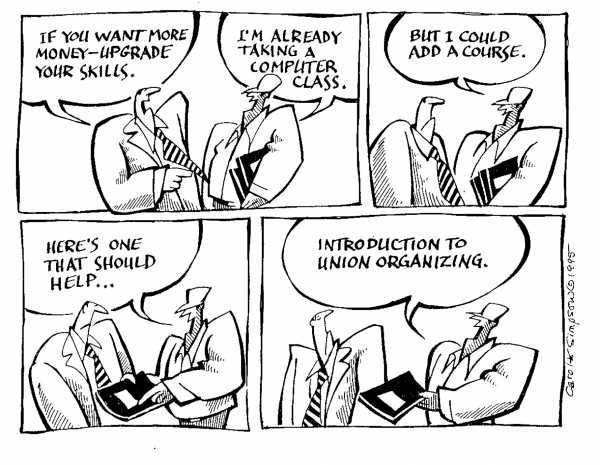





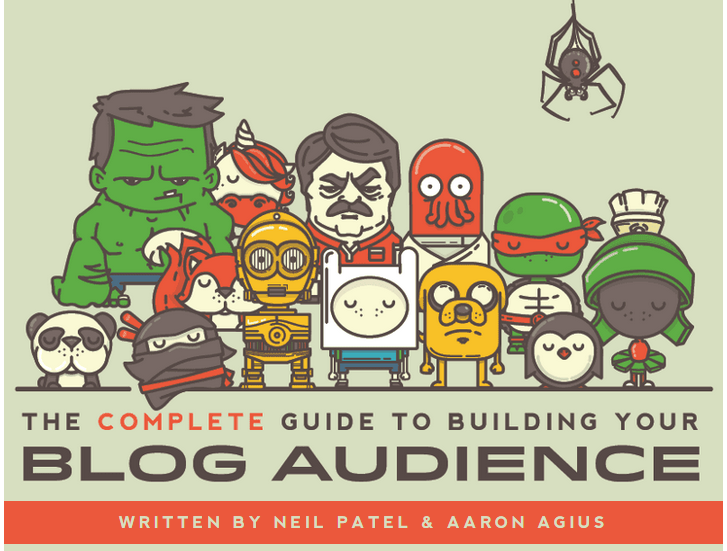


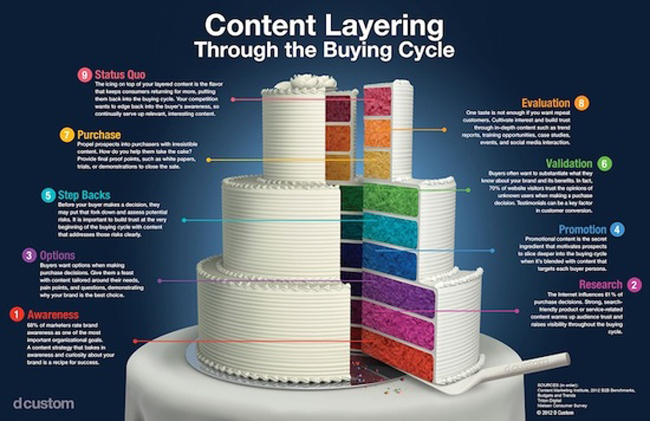




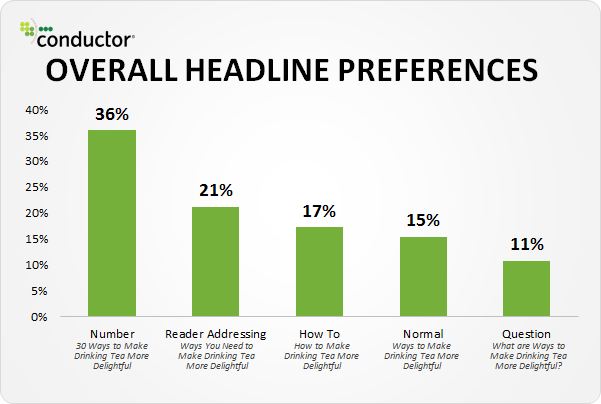




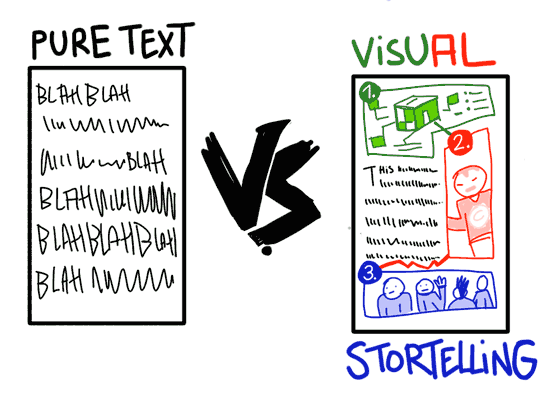

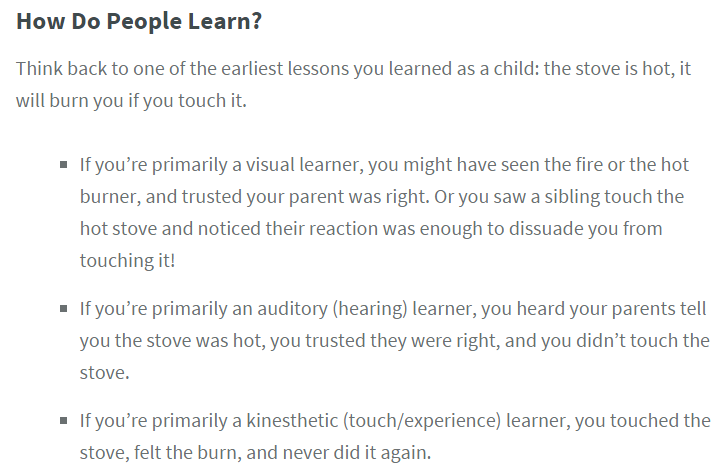
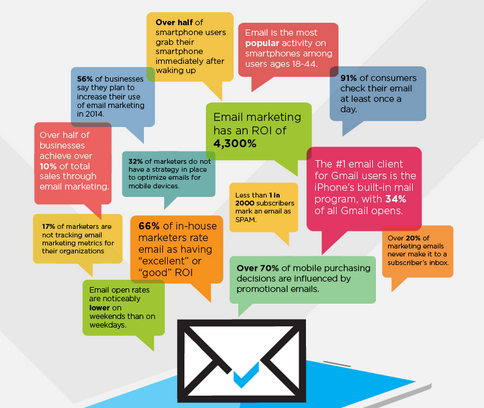
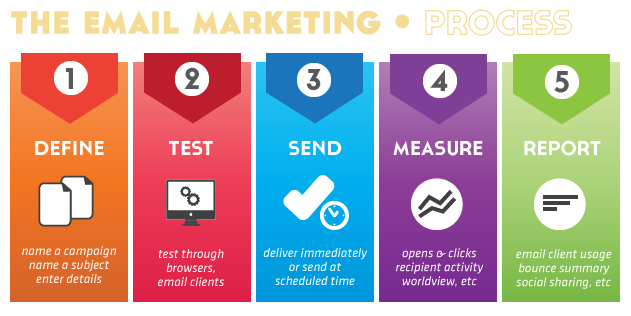





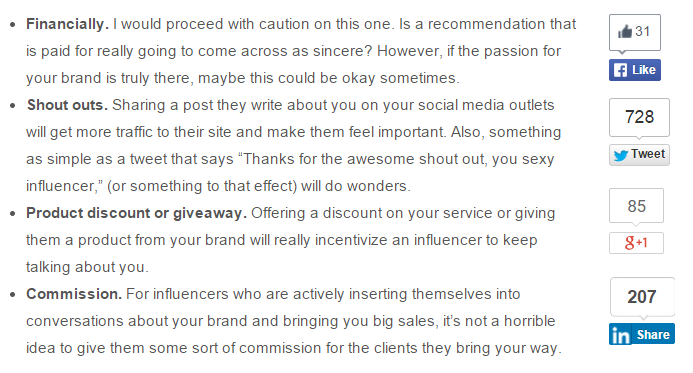


Comments (50)